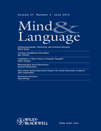
MIND & LANGUAGE
Scope & Guideline
Navigating the Depths of Language and Cognitive Science
Introduction
Aims and Scopes
- Cognitive Science and Philosophy of Mind:
The journal emphasizes the exploration of cognitive processes, including perception, belief, and intention, and their philosophical implications. - Language and Communication:
A core focus is on the relationship between language and thought, investigating how linguistic structures influence cognitive functions and social interactions. - Interdisciplinary Approaches:
MIND & LANGUAGE encourages interdisciplinary research, integrating insights from psychology, neuroscience, linguistics, and philosophy to enrich the understanding of cognitive phenomena. - Empirical and Theoretical Research:
The journal publishes both empirical studies and theoretical papers, fostering a dialogue between experimental findings and philosophical inquiries. - Exploration of Emotion and Cognition:
Research related to emotions, their descriptions, and their impact on cognition and language is a significant area of focus.
Trending and Emerging
- Cognitive Flexibility and Language Independence:
Emerging discussions around the cognitive flexibility of both humans and non-human animals suggest a growing interest in how cognitive processes operate independently of language. - Interpersonal and Social Cognition:
There is an increasing focus on the social dimensions of cognition, including how interpersonal connections and group identities influence cognitive processes. - The Role of Emotions in Cognitive Processes:
Recent papers emphasize the interplay between emotions and cognition, exploring how emotional states impact reasoning, decision-making, and language use. - Integration of AI and Cognitive Models:
Research exploring the implications of artificial intelligence on our understanding of cognition and language is becoming more prominent, reflecting broader technological trends. - Context Sensitivity and Pragmatics:
A notable trend is the growing interest in context-sensitive approaches to language and meaning, particularly how pragmatic factors shape understanding and communication.
Declining or Waning
- Traditional Theories of Meaning:
There has been a noticeable decline in papers focusing on classical theories of meaning, such as referential theories, in favor of more dynamic and context-sensitive approaches. - Behaviorism and Cognitive Psychology:
Research rooted in behaviorist perspectives appears to be waning, as contemporary studies increasingly emphasize cognitive processes that account for subjective experiences. - Static Models of Language Processing:
The journal has published fewer papers advocating for static or modular views of language processing, moving instead towards fluid and context-dependent models. - Abstract Representationalism:
There is a diminishing focus on purely abstract models of representation in favor of approaches that consider embodied and situated cognition. - Philosophical Analysis of Emotion:
While emotions remain a theme, the purely philosophical analysis of emotions is less prevalent, with a shift towards more empirical investigations.
Similar Journals

Language and Cognition
Bridging Language and Cognitive ScienceLanguage and Cognition is a premier peer-reviewed journal published by Cambridge University Press, dedicated to advancing the fields of language, linguistics, and cognitive psychology. With an ISSN of 1866-9808 and E-ISSN of 1866-9859, it has rapidly established itself as a pivotal resource for researchers, educators, and practitioners alike. Recognized for its rigorous scholarship, the journal holds a Q1 ranking in Linguistics and Language and a Q2 ranking in Experimental and Cognitive Psychology for 2023, reflecting its esteemed positioning within the academic community. Since transitioning to open access in 2023, it has broadened its reach, making cutting-edge research accessible to a global audience. The journal's emphasis on interdisciplinary studies ensures a comprehensive exploration of the interactions between language and cognitive processes, fostering deeper insights and fostering collaboration across domains. Researchers and professionals looking to stay at the forefront of advancements in these vital areas will find Language and Cognition an invaluable platform for disseminating their findings and engaging with contemporary debates.

Russian Journal of Linguistics
Bridging Cultures Through the Science of LanguageWelcome to the Russian Journal of Linguistics, a prestigious journal published by Peoples Friendship University of Russia that has made significant strides in the realm of linguistic studies since its inception. With an Open Access policy established in 2019, this journal provides unparalleled opportunities for researchers, professionals, and students to share and disseminate groundbreaking linguistic research. The journal is currently ranked in the Q1 category for Linguistics and Language and boasts impressive Scopus rankings, placing 129th out of 1088 in the Arts and Humanities, and 148th out of 1167 in the Social Sciences. Focusing on a diverse range of linguistics topics, the journal aims to facilitate cross-disciplinary dialogue and foster advancements in the study of language. Located in Moscow, Russia, it champions the vibrant linguistic community by consistently publishing high-quality research that contributes to the global understanding of language dynamics. We invite you to explore the wealth of knowledge and insight the Russian Journal of Linguistics has to offer.

Languages
Connecting scholars to the heartbeat of language research.Languages, published by MDPI, is a prestigious open-access journal dedicated to the field of Linguistics and Language studies. Since its inception in 2016, this journal has rapidly established itself as a leading platform for high-quality research, achieving an impressive Q1 ranking in 2023 and standing out in both the Arts and Humanities as well as the Social Sciences categories with significant percentile rankings (76th and 74th respectively). Based in Switzerland, Languages fosters an international community of scholars who are committed to exploring the multifaceted dimensions of language, from theoretical frameworks to practical applications. With a robust e-ISSN of 2226-471X, the journal prioritizes accessibility, allowing researchers, professionals, and students to freely engage with cutting-edge research and insights. By bridging the gap between theory and practice, Languages plays a crucial role in advancing our understanding of linguistic phenomena, making it an invaluable resource for anyone invested in the study of language.
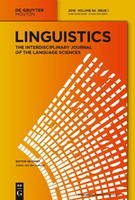
LINGUISTICS
Connecting Ideas in the World of LinguisticsLINGUISTICS, published by De Gruyter Mouton, stands as a leading journal in the field of linguistics, exemplifying innovation and scholarly rigor. With its roots tracing back to 1963 and a commitment to advancing linguistic research, this journal has consistently achieved Q1 status in both the Linguistics and Language category, marking it among the top-tier journals in the discipline. The journal is indexed with impressive rankings in Scopus, evidenced by its position within the 84th percentile in Language and Linguistics, and 83rd percentile in Social Sciences, demonstrating its significant influence and reach among scholars. Transitioning to Open Access since 2022, LINGUISTICS enhances accessibility and fosters a wider dissemination of knowledge. Published in Germany and backed by a reputable publisher, LINGUISTICS is dedicated to exploring diverse topics in linguistics, making it essential reading for researchers, professionals, and students aiming to stay at the forefront of linguistic scholarship.
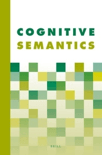
Cognitive Semantics
Navigating the Complexities of Meaning and CognitionCognitive Semantics, published by BRILL, is a leading academic journal dedicated to the intricate study of cognitive processes underlying language use and semantic meaning. With its ISSN 2352-6408 and E-ISSN 2352-6416, this journal contributes significantly to the fields of linguistics and language studies, reflecting its importance in contemporary research on cognitive linguistics. Over its publication span from 2015 to 2024, it has established a niche as a Q3 ranked journal in the Linguistics and Language category for 2023, showcasing its relevance and growing influence in the academic community. Although currently not open access, the journal aims to provide a robust platform for exchanging ideas, theories, and methodologies related to cognitive semantics, fostering interdisciplinary dialogue among researchers, professionals, and students. Readers can expect to uncover valuable insights into the cognitive mechanisms that shape our understanding of language, making this journal an essential resource for anyone involved in linguistic research.

Journal of Cognitive Science
Connecting Minds: Bridging Theory and ApplicationThe Journal of Cognitive Science, with ISSN 1598-2327, is a distinguished publication from SEOUL NATL UNIV, INST COGNITIVE SCIENCE, focusing on the multidisciplinary field of cognitive science. Established in 2016, this journal aims to advance knowledge in various domains, including Artificial Intelligence, Cognitive Neuroscience, and Experimental Psychology, while also delving into Linguistics and Language. Although currently categorized in Q4 for several subjects in the 2023 rankings, it presents an invaluable platform for innovative research and scholarly discourse, providing insights that connect cognitive processes with practical applications, thus fostering cross-disciplinary collaboration. Located in South Korea, the journal adheres to rigorous academic standards, inviting submissions that contribute significantly to understanding cognition in a digital age. While it does not offer Open Access, readers can access articles through university libraries and academic databases, engaging with the latest findings and theories that shape the future of cognitive science.

PSYCHOLOGIA
Fostering Scholarly Dialogue in PsychologyPSYCHOLOGIA is a distinguished academic journal published by the Psychologia Editorial Office, focusing on the broad field of psychology. Originating from Japan, the journal serves as a platform for innovative research and insights into various psychological phenomena, contributing significantly to the advancement of psychological knowledge since its establishment in 1996. With an ISSN of 0033-2852 and an E-ISSN of 1347-5916, PSYCHOLOGIA primarily targets researchers, professionals, and students who are passionate about the intricacies of human behavior and cognition. Currently categorized in the Q4 quartile of psychology (miscellaneous) based on 2023 metrics, it holds a Scopus rank of #157 out of 216, indicating its developing presence within the academic community. Despite being published without open access options, the journal remains committed to fostering scholarly dialogue and disseminating significant findings that shape contemporary psychological research. As it converges towards its issue set for 2024, PSYCHOLOGIA continues to be an essential resource for those seeking to deepen their understanding of psychological sciences.
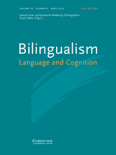
Bilingualism-Language and Cognition
Exploring the Intersection of Language and MindBilingualism-Language and Cognition, published by Cambridge University Press, is a leading journal in the fields of Education and Linguistics, renowned for its rigorous academic contributions and influential research. With an impressive impact factor placing it in the Q1 quartile of both fields, this journal ranks among the top-tier publications globally, reflecting its commitment to advancing the understanding of bilingualism and its cognitive implications. Since its inception in 2005, Bilingualism-Language and Cognition has garnered significant attention, evidenced by its remarkable Scopus rankings—11th in Language and Linguistics and 12th in Social Sciences. Dedicated to publishing high-quality original research, reviews, and integrative studies, the journal aims to foster interdisciplinary dialogue among researchers, educators, and practitioners. Although not currently an open access journal, it remains a vital resource for those engaged in bilingualism research and its cognitive dimensions, contributing to the academic landscape from its home in Cambridge, United Kingdom.
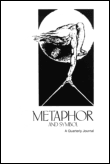
METAPHOR AND SYMBOL
Elevating Understanding in Linguistics and PsychologyMETAPHOR AND SYMBOL is a prestigious journal dedicated to advancing the study of metaphor, symbolism, and their roles in communication and cognition. Published by Routledge Journals, Taylor & Francis Ltd, this journal possesses an impressive reputation, evidenced by its Q1 rankings in both Communication and Linguistics and Language, as well as a Q3 ranking in Experimental and Cognitive Psychology. As of 2023, it holds a notable position in Scopus rankings, standing in the 86th percentile for Social Sciences in Linguistics and Language, making it a vital resource for researchers and professionals interested in the intricate interplay between language and thought. With its convergence years extending from 2007 to 2024, METAPHOR AND SYMBOL aims to publish innovative research that explores the cognitive, communicative, and social aspects of metaphor and symbolism, thereby enriching the academic discourse in its field. While this journal is not open access, its contributions are invaluable to advancing knowledge and understanding in communication, psychology, and linguistics, ensuring it remains an essential read for scholars and students alike.

Reti Saperi Linguaggi-Italian Journal of Cognitive Sciences
Advancing Interdisciplinary Insights in Cognitive SciencesReti Saperi Linguaggi - Italian Journal of Cognitive Sciences is a distinguished academic journal dedicated to advancing the field of cognitive sciences through interdisciplinary research that spans behavioral neuroscience, communication, linguistics, and developmental biology. Published by SOC ED IL MULINO, this journal has been an essential platform for scholars aiming to understand the intricate relationships between language, cognition, and social interaction since its inception in 2019. With an ISSN of 1826-8889 and an E-ISSN of 2279-7777, it is available in print and online formats, although it does not currently operate under an open access model. As of 2023, it holds a Q3 rating in Linguistics and Language, and Q4 ratings across other significant categories, signifying its emerging presence within the academic community. The journal's Scopus rankings reflect its dedication to high-quality research, positioned in the 57th Percentile in Arts and Humanities and 53rd in Social Sciences. Located in Bologna, Italy, Reti Saperi Linguaggi aims to promote critical discourse and facilitate collaboration among researchers, professionals, and students, making it a vital resource for anyone interested in the cognitive aspects of language and beyond.